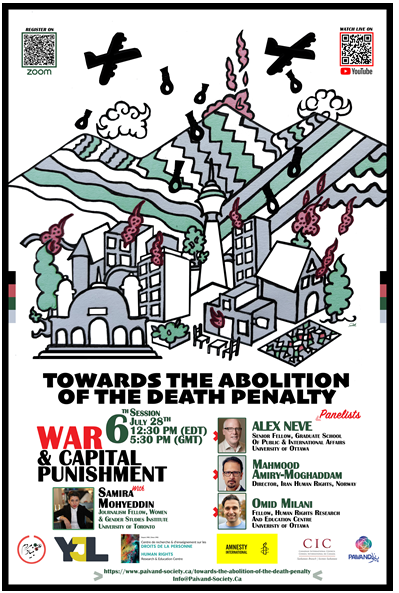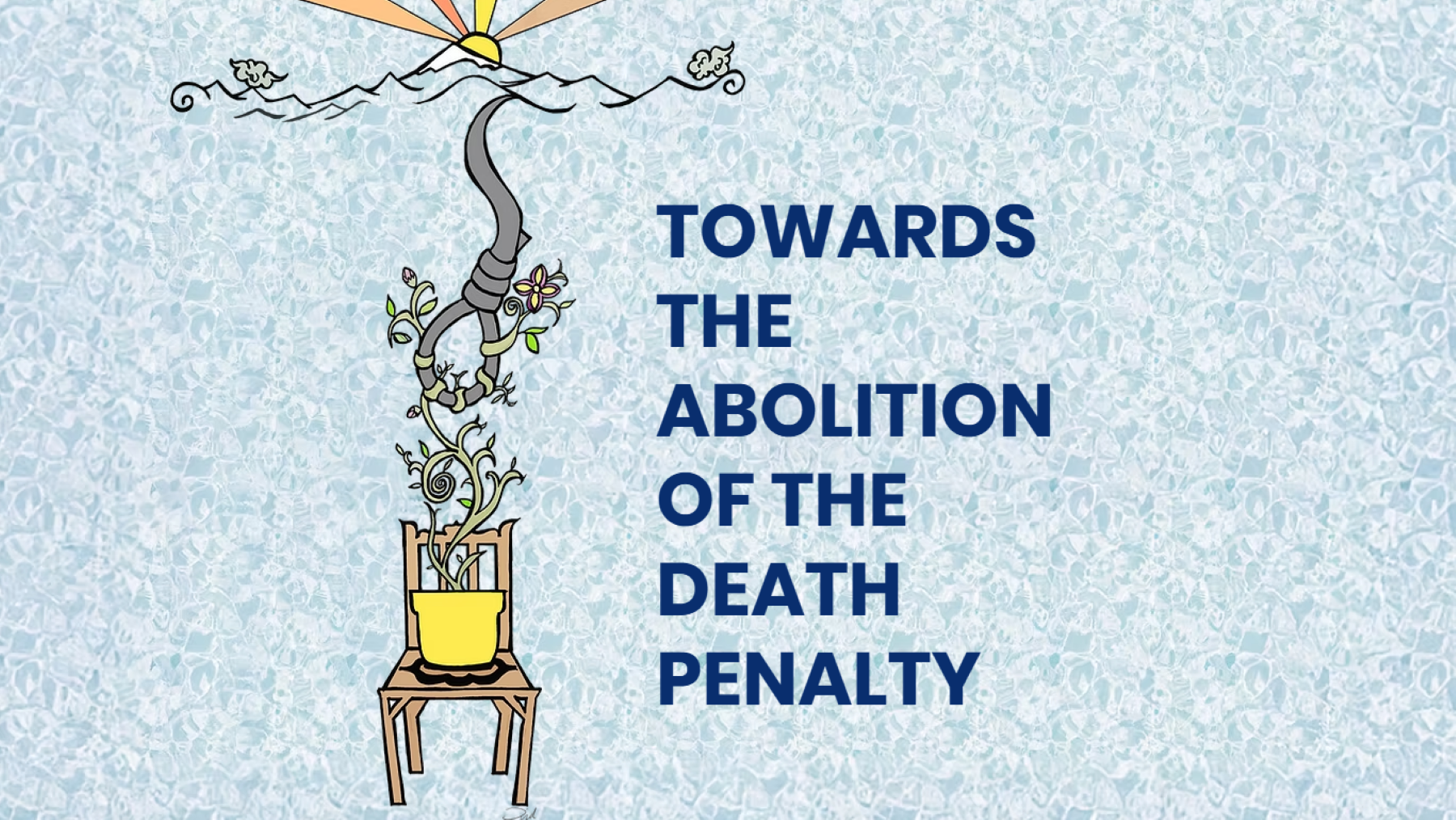Please join us on Monday, July 28 at 12:30pm-2:30pm EDT for the sixth webinar in this ongoing series on the abolition of the death penalty. This series is sponsored by Amnesty International Canada, Carleton University’s Youth & Justice Lab, The Human Rights Research and Education Centre at the University of Ottawa, The Canadian International Council (Saskatchewan Branch), The Mardom Foundation, The Paivand Society and the campaign United Against Executions in Iran.
During periods of civil, regional, international conflict, lethal force is justified, expanded, normalized. The shift from peacetime to conflict requires radical adaptations. Rights and freedoms we might enjoy in peacetime, such as opinion, assembly, and identity, may be heavily constrained. Suspicions of espionage, mutiny, sedition, sabotage, rebellion, treason, desertion, cowardice can in time come to dominate the national dialogue.
At best, crimes of this nature are opaque. Legal historians might spend years studying wartime cases and never learn quite what crime was committed, by whom or why. Nonetheless, the crucible of war turbocharges legal systems. Courts are militarized and cases are fast-tracked, often to foregone conclusions. And in countries where the death penalty is retained, the price of a conviction often is death.
This webinar will not debate the deterrence effect of the death penalty. It will present ideas about the use of the death penalty during wartime as a tool of terror targeting civil and human rights movements that might have been tolerated in peacetime that are now seen as networks of treason.
What are the human rights implications of armed conflict? What is the impact of war on human lives? What becomes of the movements that defend human rights during armed conflict? In what ways are human rights movements, including abolitionist movements, critical during armed conflict? Can the violators of human rights be held accountable? Why is it important that criminal laws and criminal processes be transparent at times of conflict?
Our Webinar Panelists and Moderator
Mahmood Amiry-Moghaddam was born in Kerman, southeast of Iran. At the age of 14 he was relocated to Norway. The research that earned him a PhD at the Center for Neuroscience and Molecular Biology at the University of Oslo was used in the work of Peter Agre, who received the Nobel Prize for Chemistry in 2003. It also merited the gold medal for the best doctorate of 2004. In 2013 he was listed as one of ‘10 of the brightest minds’ in Norway. Dr Amiry-Moghaddam is just as well known for his work in human rights. He won the Norwegian Amnesty International human rights prize in 2007 for bringing attention to rights violations in Iran, in particular to cases involving the death penalty and human rights abuses of children.
Alex Neve is best known among Amnesty Canada members for his role as a dynamic, articulate and tireless Secretary General of AIC(ES) from 2000 to 2020. His work involved research and human rights advocacy in Africa, Asia, Latin America, Guantánamo Bay, and First Nations in Canada. He earned an LLB at Dalhousie University and a Master’s degree in International Human Rights Law at the University of Essex. He has taught at Osgoode Hall Law School, worked with York University’s Centre for Refugee Studies, worked in private practise as a refugee lawyer and community clinic. He is the recipient of the Order of Canada and Queen Elizabeth II Diamond Jubilee Medal. He is presently adjunct professor in international human rights law at the University of Ottawa and Dalhousie University.
Omid Milani is an expert on state-sponsored violence and human rights law at the University of Ottawa and fellow at the ‘Human Rights Research and Education Centre’. He treats the many aspects of human rights – legal processes, application of state power, civil and common law, Shia Sharia law – as a multidisciplinary process. It’s when written and spoken language is deficient in expressing difficult ideas that his work as a multimedia artist and curator takes over.
Our moderator Samira Mohyeddin has a Master of Arts in Modern Middle Eastern History and Gender from the University of Toronto and Genocide Studies from the Zoryan Institute. She is the inaugural 2024 / 2025 Journalism Fellow at the University of Toronto’s Women and Gender Studies Institute. Samira is an award-winning journalist and producer. For nearly ten years she was a producer and host at CBC Radio and CBC Podcasts. She resigned in November of 2023 and founded ‘On The Line Media’.

Upcoming webinars in this series on the abolition of the death penalty
Towards the Abolition of the Death Penalty is a virtual panel discussion series that will tackle the complex question of the death penalty with a view to its abolition in retentionist states, particularly in the contemporary context of the Middle East, in Iran, Saudi Arabia, Afghanistan, Egypt, Syria, and Iraq. The panel series will provide in-depth discussions on the death penalty from diverse legal, philosophical, sociological, psychological, and political perspectives. The speakers will address and put in context current instances of the death penalty, exploring the dynamics involved in this criminal sanction. The series aims to create a dialogical platform for everyone interested in engaging with the abolitionist discourse to discuss the possibilities and challenges to put an end to the death penalty. Each session will introduce the audience to significant aspects of capital punishment, expounding theoretical and practical particularities of the sanction.
September 13 – Session 7, Capital Punishment and the Iranian legal system
Hossein Raeesi, Iranian lawyer, defended death penalty cases in Shiraz for 20 years, Adjunct Professor, Carleton University
Hasan Fereshtian, Defence Attorney of Iranian Dissidents
October 11 – Session 8, Children, Trauma and the Death Penalty
Judy Finlay, Child Welfare and Children’s Mental Health advocate, Toronto Metropolitan University
Hossein Raeesi, Iranian lawyer, defended death penalty cases in Shiraz for 20 years, Adjunct Professor, Carleton University
Sandra Joy, Professor of Sociology, studies impact of death penalty on families, Rowan University
November 8 – Session 9, Sociological Perspectives
Hosein Ghazian, Iranian Sociologist, Theorist, Commentator, Researcher, Author, Photographer
Saeed Paivandi, Professor of Education, University of Lorraine
December 10 – Session 10, Non-Violence and Forgiveness (Human Rights Day)
Payam Akhavan, Massey Chair in Human Rights, human rights lawyer, University of Toronto
Ramin Jahanbegloo, Director of ‘Mahatma Gandhi Centre for Nonviolence and Peace Studies, New Delhi, Visiting Professor, St. Andrews University
Omid Milani, Fellow, Human Rights Research and Education Centre, Artist, University of Ottawa
Note: dates and speakers subject to change
Poster & Artwork Design © Omid Milani






















